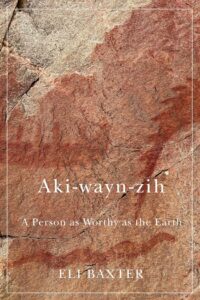Book review: Aki-wayn-zih: A Person as Worthy as the Earth
In Aki-wayn-zih: A Person as Worthy as the Earth, Baxter deftly weaves together a complex argument that is immensely readable and enjoyable through a wonderful display of Anishinaabeg storytelling skills. Baxter writes of his life on land as a child, the importance of learning Anishinaabemowin, lessons learned through stories and experiences, and surviving the Indian Residential School System. The work is driven by Baxter’s desire to see Anishinaabemowin revitalized and once again forming the basis of Anishinaabeg education. He concludes that a strong linguistic and cultural education will enable our youth to not only ground themselves, but succeed in all forms of learning offered in Canada. To this end, Baxter’s Aki-wayn-zih uses the concept of Kih-kayn-daa-soh-win (knowledge) as embedded within Anishinaabemowin.
The book is divided into three parts – “Part One: Anishinaabay Kih-kayn-daa-soh-win,” “Part Two: Ish-poh too-kin-nih-go-yung,” and “Part Three: Residential School”. Each part contains a number of chapters that expand on the core concepts of Baxter’s argument. For instance, in Part One, Baxter talks of how knowledge is transmitted orally through listening and gradually learning the language as one grows. Part Two discusses Baxter’s experiences and lessons as a child with his parents in the Albany River region hunting, fishing, and gathering, as well as trading and guiding whites. Here he speaks of how the lessons of the land and language were passed from generation to generation. Baxter also notes how his generation is the last to know of and experience the hunting and gathering life and the last to learn directly from those individuals. This section is full of youthful high jinx and stories of life before the increasing penetration of Euro-Canadians and tourists. Part Three is his story of surviving the Indian Residential School System. Baxter notes on several occasions throughout the story that he asked to go to Residential School so that he could learn to count to 10 in English like his siblings and cousins. This request, according to Baxter, disappointed or upset his parents and likely made him the only Anishinaabe to ask to go to Residential School. While portions of this section can be described as ‘light-hearted,’ it is tinged with a sense of sadness, absence, and loss. Throughout his story, Baxter presents readers with Anishinaabemowin words for places, plants, people, and animals. The words, once given with translation, then reappear throughout the text as a given, forcing the reader to either remember or seek the word’s first usage. A glossary would have been helpful at time. These lessons nicely coincide with Baxter’s argument about the importance of learning the language to gain Anishinaabe Kih-kayn-daa-soh-win.
Overall, Baxter’s work lovingly takes us on a journey, following his reminiscences of his life on the land. Importantly, the journey serves as a subtle teaching of Anishinaabeg culture, customs, and experiences that is strongly grounded in Anishinaabemowin and Kih-kayn-daa-soh-win. It is easy to see why Baxter won the 2022 Governor General’s Literary Award for English-Language Nonfiction. This work in all its complexities and lessons is wonderful and easy to read by anyone interested in learning about the Anishinaabeg. It is easily suited for youthful and adult readers alike; each will likely draw different but equally important lessons from Baxter’s narrative. Aki-wayn-zih is a book that you will be unable to put down and will read again for its story and lessons.
Eli Baxter. Aki-wayn-zih: A Person as Worthy as the Earth. Montreal: McGill-Queen’s University Press, 2021.
ISBN: 0228008077



